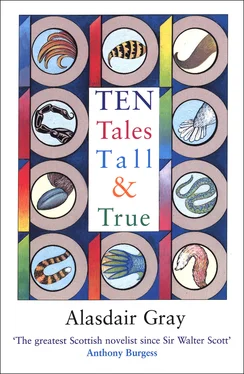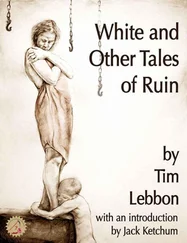The teacher at once thinks of the married couple as Mr and Mrs Dear. Delighted to have started a conversation before the journey begins she says, “In most railway accidents the train is struck in the rear, isn’t it? So statistically speaking we are safer near the engine.”
“That’s stupid!” squeaks the child.
The mother says, “Don’t be rude Patsy,” but the teacher says eagerly, “Oh please, I’m a teacher! Retired! But I know how to handle difficult children. Why is what I said stupid Patsy?”
“Because in collisions the front of one train always hits the front or back of another, so the safest place in a train is always the middle.”
The old man chuckles slightly, the other adults smile. After a moment of silence the teacher opens her purse, removes a coin and says, “Patsy, here is a bright new silver-looking fivepound coin. I give it to you because what I said was stupid and you were right to correct me.”
The child grabs the coin. The other adults stare at the teacher and the conversation seems about to take a new direction when it is interrupted.
A melodious chime comes from the upholstery of the chair-backs then a quiet, firm, friendly voice saying, “Good day good people! This is Captain Rogers, your driver, welcoming you aboard the 1999 Aquarian from Bundlon to Shaglow, stopping at Bagchester, Shloo, Spittenfitney and Glaik. The Aquarian leaves at the end of this announcement, arriving at Bagchester exactly forty-one minutes later. Tea, coffee, sandwiches, will be served at half twenty-three hours, and in accordance with the latest stock-market reports, tea will be one point sixty pounds, coffee one point ninety-nine. Sandwiches are still last week’s price and expected to remain stable for the duration of the journey. The bar is now open. British Rail trust you will have a comfortable trip. Thank you.” Through the window on her left the teacher sees a pillar supporting the station canopy slide sideways, then a view of slate rooftops and shining tower blocks turning indistinct and vanishing.
The other passengers are complaining about the price of tea. The teacher says, “But I’m glad they warned us. When is half twenty-three hours? It’s a sign of senility for a retired teacher to admit this, but I can’t grasp this new way of telling the time.”
“Half past eleven, isn’t it?” says the housewife uncertainly.
“A.m?”
“Yes, isn’t it?”
The old man says abruptly, “Don’t be daft Miriam. Half twenty-three hours is twelve from twenty-three and a half, which is eleven and a half, so half past eleven p.m.”
“No no no!” cries the child excitedly, “Our headmaster says we shouldn’t think about time in twelves because of computers and demicals. Computers can’t count in demicals, so half twenty-three hours is half past twenty-three.”
“Patsy!” says the old man in a low steady voice, “If you say one more word within the next ten minutes I shall remove the whole weight of my fist from the side of your jaw!” but the teacher merely sighs. Then says, “I wish they had let us keep the old noon with the twelve hours before and after it. But even the station clocks have changed. Instead of a circular face with all the hours and minutes marked around the edge, past AND future, we have a square panel with nothing in it but the minute we’re at now. Nothing eight hours twenty minutes, then flick! — it’s nothing eight hours twenty-one. That makes me feel trapped. Trapped, yet pushed at the same time. And I’m sure computers could be taught how to count in twelves, I hear some of them are quite intelligent. I hate that little flick when one minute becomes the next.’
“I hate it too dear,” murmurs Mrs Dear and, “So do I dear, please shut up,” says her husband.
“Time and money!” says the teacher sighing again, “So much disappeared so suddenly: the little farthings with jenny wrens on them, thick brown threepennies, silver sixpences, the old ha’penny. Did you know, Patsy, that ha’pennies were once a whole inch in diameter, the size of the modern twopenny?”
“What’s an inch?” says the child.
“Two point five three nine nine nine eight centimetres. And the old pennies were lovely huge lumps of copper, two hundred and forty to the pound, we shall not see their like again, with Britannia ruling the waves between a small battleship and the Eddystone lighthouse. Britannia was a real woman, you know. Not many people realize that. She was copied from a — a girl friend of the Merry Monarch, not Nell Gwynne. The old pennies had room for so much history on them. They were history! Even in the sixties you still found coins with young Queen Victoria’s head on them, and the old Queen was so common we took her for granted. Just think! Every time we went shopping we were handling coins which had clinked in the pockets of Charles Dickens and Doctor Pritchard the poisoner and Isambard Kingdom Brunei.”
“It might interest you to know, madam,” says Mr Dear, “That the weight of a modern penny, subtracted from a pre-decimal penny, left enough copper to construct circuits for nine hundred and seventy-three pocket television sets.”
“But WAS IT?” shouts the old man so violently that everyone stares at him and Mr Dear says, “I beg your pardon?”
“The copper!” says the old man excitedly, “The copper saved by switching to a smaller currency was NOT used to make cheap television sets for the masses! It was used to build the circuits of an electronic nuclear defence system that cost the British tax-payer a hundred and eighty-three thousand MILLION pounds and was obsolete two years before it was finally installed!”
“I have no wish to discuss politics with you sir,” says Mr Dear, looking out the window again. The old man snorts and concentrates on his paper.
The women are the most embarrassed by the ensuing silence. The mother sends Patsy to the buffet bar to buy a chocolate biscuit with her new coin, and in a low voice the teacher asks the mother the sex of her little child. The mother, also in a low voice, explains that she thinks there is too much sex nowadays, that her mother never mentioned it, that Patsy will make up her own mind as soon as he’s old enough to choose. The teacher nods approvingly, but says in her experience children are grateful for a little guidance. The mother disagrees; says that all a child should learn from its parents is proper manners; says at least Patsy won’t turn into one of these dreadful women’s lib ladies — or a teddy boy. The old man surprises them by saying suddenly,
“A cat.”
“What’s that Dad?” asks his daughter.
“Teddy boys were forties,” he explains, “Beatniks fifties. Hippies sixties. Mods and rockers seventies. Punks eighties. And now they call themselves cool cats.”
“Are you sure?” asks the teacher, “There have been so many strange names for young people — skinheads, bobby-soxers, flappers, knuts, mashers and macaronis — that I’ve started thinking of them as youths. The police reports always call them youths.”
“And quite right too!” mutters Mr Dear, and would say more but again the musical warbling introduces the firm friendly voice.
“Good day good people — Captain Rogers here. We are making excellent time. On our left we are flashing past the reforested bings of the outer Bundlon slag depot, on our right are the soya fields of the British Golliwog Jam Corporation. I regret that a special stock-market news flash has obliged us to raise the price of coffee to two point forty pounds a cup—” (the passengers’ cries of rage and disgust drown the announcement for a while) “—biscuits are expected to remain stable at least as far as Shloo. Passengers with an interest in transport will not need to be told that today is a special one for British Rail. In one and a half minutes it will be precisely the hundred and fiftieth anniversary of the exact moment when Isambard Kingdom Brunei—” (“Brunei!” gasps the teacher) “— tapped the last ceremonial rivet into the Grand Albert Royal Pennine Suspension Bridge: the first broad-gauge box-girder suspension bridge in the history of engineering. To honour the occasion we will now play you The Railways of Old England , orchestrated and sung by Sir Noël Coward. Through the length and breadth of Britain, in trains trundling through the lonely Pass of Killiecrankie or thundering across the Stockport viaduct, passengers are rising to their feet to hear Noël Coward sing The Railways of Old England .”
Читать дальше












